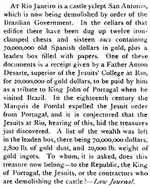Joe - you never answered my questions?

Perhaps it would refresh your membory to re-read that letter of Bishop Pallafox? It is included in this reply, in ref to a different post.
Reb wrote
That is a key issue isn't it? As the current Pope is a Jesuit, it would be interesting to know the answer to that question. However it is more important to ask the question in the past tense; for while the Jesuits operating in Spanish (and the rest of) Colonial America were actively mining and accumulating treasures, did the Pope know about it at the time? Since the Jesuits loved to say that their properties and wealth belonged to "the Church" yet the Church never seems to have had any knowledge of this wealth. I think it is very enlightening that Bishop Pallafox, sent to Mexico to look into matters there, was so alarmed about what he found that he felt he needed to write directly to the Pope. Here is that letter (in English) which Joe takes such objection to, based on Pallafox being so virulently filled with hatred of Jesuits. Quote
Most Holy Father,
I found almost all the wealth all immovables and all treasures of this Province of America in the hands of the Jesuits who still possess them. Two of their colleges have 30,000 sheep without counting the small flocks and whilst almost all the cathedral churches and all the Orders together have hardly three sugar refineries the Society alone has six of the largest. One of these refineries is valued at more than half a million thalers and this single Province of the Jesuits which however only consists of ten colleges possesses as I have just said six of these refineries each one of which brings in 100,000 thalers yearly. Besides this they have various corn fields of enormous size . Also they have silver mines and if they continue to increase their power and wealth as excessively as they have done up to now the secular clergy will become their sacristans and the laymen their stewards whilst the other Orders will be forced to collect alms at their doors. All this property and all these considerable revenues which might make a sovereign powerful serve no other purpose than to maintain ten colleges. To this may be added the extraordinary skill with which they make use of and increase their superabundant wealth. They maintain public warehouses, cattle fairs, butchers stalls, and shops. They send a part of their goods by way of the Philippine Islands to China. They lend out their money for usury and thus cause the greatest loss and injury to others
<Don Juan Palafox Briefe an Papst Innozenz X Frankfort and Leipzig 1773 pp 7-9, letter of May 25th 1647 from John Palafox Bishop of Los Angeles wrote to Pope Innocent X >
Bishop Pallafox felt his own life in danger while in Mexico from the Jesuits and went into hiding for a time, and was as noted earlier, twice ex-communicated by the Jesuits for his efforts. They could not get him as destroyed as they would have wished but did get him removed from Mexico and put out of the way.
Note also that this was done in 1646-47, exactly the period of the bonanza production of Tayopa, and the same time period as the Tayopa Inventory document. It is entirely possible that the silver mines referred to by Pallafox were Tayopa. The Jesuits continued to operate and expand in all of the Spanish, French and Portuguese colonies until the 1750s when the crackdowns started.
Mike's point about having layers of deniability protecting those at the top are also valid; we have posted previously the example of the French Jesuits, when one of their ship loads of rich cargo was captured by pirates, the courts of France found the Jesuits liable, and they decided to burn the single priest of Martinique as if he had controlled and orchestrated the entire commercial enterprise of the Jesuits in French Colonial America.
Mike pointed out the 1751 Pima rebellion as being largely due to the Jesuits, this is not the only such example; the 1740 Yaqui revolt was also due to Jesuit padres mistreating the Indians, as was pointed out earlier. Power corrupts, and absolute power corrupts absolutely, now remember that these padres, operating out on the very fringes of "civilization" among heathen Indians, had absolute power, backed by Spanish soldiers and trusted Indian lackeys.
Side thing here (to Mike) but I do realize that slavery was not illegal at that time; however we have people today whom deny that the Jesuits had any slaves and were not involved in the slave trade, that rather, they were the protectors of the poor Indians from enslavement by the evil Spaniards. While they did make efforts to prevent the Indians of their missions from being pressed into service working in the mines (and elsewhere) by the Spanish, they were using those same Indians in forced labors themselves, so it is not like they were protecting them from slavery,
they were keeping their Indians as their own private stock of slave labor. Hardly "protecting" them from slavery if you are using them like slaves yourself.
I won't say that the Jesuit missionaries did no good whatsoever, but their good works serve to mask their subversive political intrigues, their massing of wealth and properties, and power. It is not exactly fair to use this simile, but Hitler built the famous Autobahn highways of Germany, had Volkswagen designed for a car that ordinary working people could afford, and restored the ruined economy of Germany; of course he plunged the world into a massive war and tried to exterminate millions, so do we turn a blind eye to the evils, for the sake of the good deeds? The Jesuit padres may well have wished to save the souls of the heathens, but this was not their only activity by any stretch of the imagination - for that matter Cortez felt he was bringing the blessings of Christianity to the Aztecs, which was not the only thing he brought them either.
Sorry for yet another long-winded post; oh and one other thing -
Gollum wrote
Joe,
Quit sounding like MSNBC.
Mike I would never have guessed that you watch MSNBC?

Good luck and good hunting amigos, I hope you find the treasures that you seek.
Oroblanco








